| Source (Hebrew) | Adaptation (German) | Translation of German (English) |
|---|---|---|
יְהַלְלֽוּךָ יְיָ אֱלֹהֵֽינוּ (על) כָּל־מַעֲשֶֽׂיךָ, וַחֲסִידֶֽיךָ צַדִּיקִים עוֹשֵׂי רְצוֹנֶֽךָ, וְכָל־עַמְּךָ בֵּית יִשְׂרָאֵל, |
Es preisen Deine Werke Dich, o Gott, Und Deinen Namen rühmen alle Frommen, Und Deine Heiligkeit wird froh bekannt. |
Your works praise You, O God, and Your name is praised by all the pious, and Your holiness is joyfully known. |
Denn Freude ist es, Ewiger, Dir zu dienen, Und Dich erkennen ist uns reinstes Glück Und Deine Macht bewundern ist uns Wonne, Und wie die Mutter hört des Kindes Stammeln, Das sinnlos klingt, ein Nichts dem fremden Ohr, Und das doch Liebe ist und Liebe meint Und danken will für nie vergoltne Liebe, |
For joy is it, Eternal One, to serve You, And to recognize You is our purest happiness And to admire Your power is our delight, And as the mother hears the child’s stammering, That sounds senseless, a nothing to the foreign ear, And yet that is love and means love And wants to give thanks for love that is never forgotten, | |
בְּרִנָּה יוֹדוּ וִיבָרְכוּ, וִישַׁבְּחוּ וִיפָאֲרוּ, וִירוֹמְמוּ וְיַעֲרִֽיצוּ, וְיַקְדִּֽישׁוּ וְיַמְלִֽיכוּ אֶת שִׁמְךָ מַלְכֵּֽנוּ. כִּי לְךָ טוֹב לְהוֹדוֹת, וּלְשִׁמְךָ נָאֶה לְזַמֵּר, כִּי מֵעוֹלָם וְעַד עוֹלָם אַתָּה אֵל. בָּרוּךְ אַתָּה יְיָ, מֶֽלֶךְ מְהֻלָּל בַּתִּשְׁבָּחוֹת: |
So nimm in Gnaden unsre Lobgesänge, Und huldvoll unsre Dankeslieder auf |
So receive our songs of praise with grace, And graciously too our songs of thanksgiving |
Und lass vertrauen uns zu jeder Zeit, Dass, was auch uns und unsrem Volke droht, Du, unser starker Helfer in der Not, Uns schützen wirst in alle Ewigkeit. |
And let us trust at all times, That whatever threatens us and our people, You, our strong helper in trouble, will protect us for all eternity. |
This adapted translation by Lisa Tarlau of Yehallelukha (“May all Your creations praise You”) can be found in Rabbi Max Grunwald’s anthology of Jewish women’s prayer, Beruria: Gebet- und Andachtsbuch für jüdische Frauen und Mädchen (second revised edition 1909), page 169.
In the Encyclopedia of Jewish Prayer (1992), Macy Nulman notes that Yehallelukha is first referenced in Pesachim 118a as the “Birkhat ha-Shir”. He continues, “The Amora’im are divided as to whether [the prayer] Nishmat is also called Birkat Hashir, and thus both Yehalellukha and Nishmat are said at the Seder on Passover. Yehallelukha and the prayer Yishtabaḥ are similar in phraseology, and just as Yishtabaḥ concludes the recital of Pesuqei Dezimrah, so Yehallelukha follows the Hallel psalms.”
The earliest liturgical text of Yehallelukha we know of is found in the Maḥzor Vitry, Laws of Pesaḥ, 97:11. (Please correct us if you know an earlier attestation.) As Macy Nulman notes, there are many variations of the text itself. The text provided here is from the Hallel service in the nusaḥ ha-ARI z”l of the ḤaBaD movement.
The transcription of the German provided machine-readable text for machine translations by DeepL, which we then edited for accuracy and clarity. We welcome any/all corrections, improvements, and additional transcriptions and translations of this work’s contents. –Aharon Varady
Source(s)

“יְהַלְלֽוּךָ | Yehallelukha, an adapted German translation for Hallel by Lisa Tarlau (1909)” is shared through the Open Siddur Project with a Creative Commons Attribution-ShareAlike 4.0 International copyleft license.
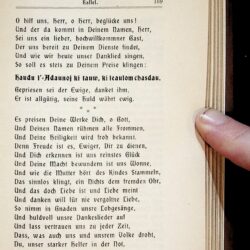
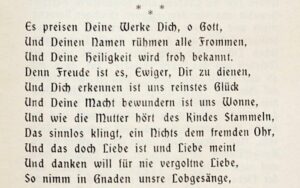

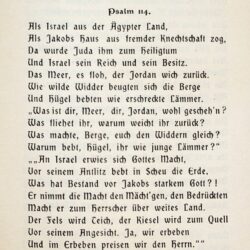
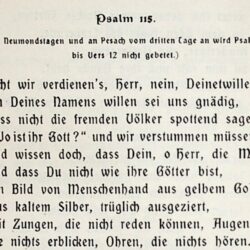
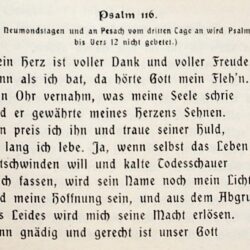
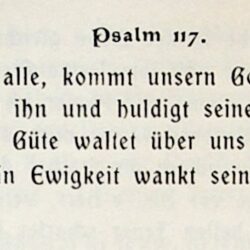
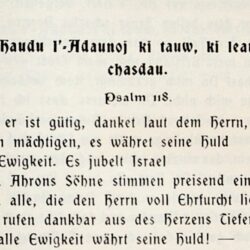
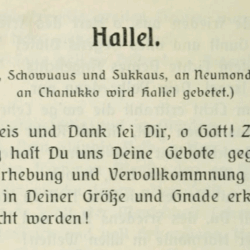


Leave a Reply